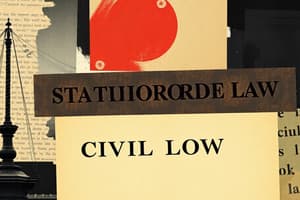Podcast
Questions and Answers
What are the main components of parental authority in relation to a child's care?
What are the main components of parental authority in relation to a child's care?
The main components of parental authority in relation to a child's care include making decisions about the child's health, education, and overall well-being.
Explain the difference between parental authority ceasing ipso iure and being forfeited.
Explain the difference between parental authority ceasing ipso iure and being forfeited.
Parental authority ceases ipso iure when it naturally comes to an end, while forfeiture involves a punitive action where authority is taken away due to certain behaviors.
In what situations can a court intervene in parental authority disputes?
In what situations can a court intervene in parental authority disputes?
A court can intervene in parental authority disputes when parents disagree on decisions regarding their child’s care, or if one parent is not acting in the child's best interests.
How can the opinions of older children be considered in legal proceedings regarding parental authority?
How can the opinions of older children be considered in legal proceedings regarding parental authority?
What role do parents have in managing their child's property?
What role do parents have in managing their child's property?
What happens to parental authority upon the marriage of the child?
What happens to parental authority upon the marriage of the child?
Under what condition will parental authority not cease if only one parent fails to register legal hypothec?
Under what condition will parental authority not cease if only one parent fails to register legal hypothec?
What is one circumstance that leads to the automatic termination of parental authority?
What is one circumstance that leads to the automatic termination of parental authority?
What age marks the automatic end of parental authority?
What age marks the automatic end of parental authority?
What must a surviving parent do before remarrying to maintain parental authority?
What must a surviving parent do before remarrying to maintain parental authority?
What occurs if a child leaves the parental home with parental consent?
What occurs if a child leaves the parental home with parental consent?
What legal mechanism provides for the registration necessary to maintain parental authority?
What legal mechanism provides for the registration necessary to maintain parental authority?
Explain the impact of a parental failure to register on their authority.
Explain the impact of a parental failure to register on their authority.
What are some specific events that can lead to ipso jure termination of parental authority?
What are some specific events that can lead to ipso jure termination of parental authority?
Can a parent regain parental authority after losing it? If so, under what conditions?
Can a parent regain parental authority after losing it? If so, under what conditions?
What is forfeiture in the context of parental rights?
What is forfeiture in the context of parental rights?
List two examples of parental misconduct that could lead to forfeiture.
List two examples of parental misconduct that could lead to forfeiture.
What impact does a child's marriage have on parental authority?
What impact does a child's marriage have on parental authority?
What is the legal consequence of not registering a legal hypothec for a child's property?
What is the legal consequence of not registering a legal hypothec for a child's property?
What role does mental incapacity play in forfeiture of parental rights?
What role does mental incapacity play in forfeiture of parental rights?
In what scenario can a surviving parent's remarriage affect parental authority?
In what scenario can a surviving parent's remarriage affect parental authority?
Describe how establishing an independent life can terminate parental authority.
Describe how establishing an independent life can terminate parental authority.
What might be included in the 'mismanagement of the child's property' that leads to forfeiture?
What might be included in the 'mismanagement of the child's property' that leads to forfeiture?
Flashcards
When does parental authority cease due to death?
When does parental authority cease due to death?
The legal authority of parents over their children ends automatically (ipso jure) when both parents or the child dies.
How does reaching the age of majority affect parental authority?
How does reaching the age of majority affect parental authority?
A child reaching the age of 18 years automatically ends parental authority.
How does marriage affect parental authority?
How does marriage affect parental authority?
When a child gets married, parental authority over them automatically ends.
How does a child leaving home impact parental authority?
How does a child leaving home impact parental authority?
Signup and view all the flashcards
How does failing to register property rights impact parental authority?
How does failing to register property rights impact parental authority?
Signup and view all the flashcards
What happens when only one parent fails to register property rights?
What happens when only one parent fails to register property rights?
Signup and view all the flashcards
How does a surviving parent remarrying affect parental authority?
How does a surviving parent remarrying affect parental authority?
Signup and view all the flashcards
What legal steps are needed before remarrying for a surviving or adoptive parent?
What legal steps are needed before remarrying for a surviving or adoptive parent?
Signup and view all the flashcards
What does Parental Authority encompass?
What does Parental Authority encompass?
Signup and view all the flashcards
What does Shared Responsibility mean for Parental Authority?
What does Shared Responsibility mean for Parental Authority?
Signup and view all the flashcards
What happens if parents disagree about Parental Authority?
What happens if parents disagree about Parental Authority?
Signup and view all the flashcards
Do kids have a say in Parental Authority matters?
Do kids have a say in Parental Authority matters?
Signup and view all the flashcards
When can one parent act without the other's consent in Parental Authority cases?
When can one parent act without the other's consent in Parental Authority cases?
Signup and view all the flashcards
Ipso Jure Termination
Ipso Jure Termination
Signup and view all the flashcards
Forfeiture of Parental Rights
Forfeiture of Parental Rights
Signup and view all the flashcards
Age of Majority
Age of Majority
Signup and view all the flashcards
Marriage
Marriage
Signup and view all the flashcards
Independent Living
Independent Living
Signup and view all the flashcards
Failure to Register Property
Failure to Register Property
Signup and view all the flashcards
Remarriage Without Inventory
Remarriage Without Inventory
Signup and view all the flashcards
Harmful Conduct to Education
Harmful Conduct to Education
Signup and view all the flashcards
Mental Incapacity
Mental Incapacity
Signup and view all the flashcards
Reinstating Parental Authority
Reinstating Parental Authority
Signup and view all the flashcards
Study Notes
Law of Persons - Civil Code
- Relates to articles about individuals in the Civil Code, including maintenance, spousal rights, and obligations of ascendants and descendants. Ascendants may have a duty to maintain grandchildren.
- Parental Authority: Parents' rights and responsibilities over children, including custody. Article 3B discusses parental figures acting in place of parents.
- Repudiation: The opposite of filiation, involving disowning a child. A child's surname can be maintained if known by it throughout their life, even if paternity later changes.
- Maintenance: Obligations for providing support to family members. Includes food, clothing, medical care, housing, and education expenses, often split equally between parents. Maintenance pendente lite is for support during litigation.
- Maintenance in kind: Offering suitable housing or accommodation instead of monetary payments.
- Civil Code Article 3: Spouses have a duty to support each other and contribute to family needs proportionally to their means and abilities.
- Article 46A: Allows either spouse to demand maintenance during separation proceedings, considering their needs, and other circumstances. The spouse's ability to provide is a factor.
- Article 23: The person obliged to provide maintenance cannot be forced to pay money if they offer suitable accommodation instead.
- Article 3B: Explains maintenance obligations for children until the age of majority (18) or 23 if in education; this may continue for disabled children.
- Maintenance amounts: Determined on a case-by-case basis, with consideration for factors such as the parents’ income. A customary minimum of €200 per month plus half of health/education costs are often used.
- Parental authority: The rights and responsibilities parents have over children.
- Custody: The right to make decisions for a child.
- Differences between parental authority and custody: Custody is a decision-making right for a parent regarding a child's needs, while parental authority encompasses overall rights and responsibilities.
- Article 131: A child is subject to parental authority as established by law, but it's usually exercised jointly by both parents; the surviving parent takes on the role if one parent dies.
- Parental Authority Cessation: Parental authority can cease automatically (ipso jure) upon certain events, like the child turning 18 or the death of a parent. Parental authority can also be forfeited due to misconduct.
- Parental Authority Reinstatement: Parental authority which has been forfeited can be reinstated by the court in specific circumstances. Factors such as a child's best interest are considered.
- Emancipation: A minor can gain certain adult legal rights, allowing them to enter into contracts or certain trades.
- Filiation: Establishing a child's familial relationship and connection for the child's benefits.
- Paternity Determination: Process for establishing a child's parent, using DNA tests, and various forms of evidence. Exhumation to aid the process can be considered in specific circumstances.
- Acts of ordinary administration of a child's property are done by a single parent; extraordinary acts require both parents.
- Proceedings to clarify parentage: If there are disputes over parentage, the court can require individuals to consent to genetic testing and the taking of a genetic sample. The court has the right to substitute consent if it's not provided.
- Registration of Birth: Birth certificates are a key proof of parentage.
- Presumptions of paternity: Laws concerning children born in wedlock. The mother is usually considered the certain parent.
- Children born out of wedlock: Generally, children outside of a marriage are also subject to parental obligations and rights.
- If one parent is unavailable, or the court deems it necessary, parental authority can be given to one parent only.
- Child's Surname: Regulations regarding the child's surname when conceived and born in wedlock or out of wedlock.
- Judicial Demand: Proceedings used in cases where one parent wants the court to determine parentage.
Studying That Suits You
Use AI to generate personalized quizzes and flashcards to suit your learning preferences.




